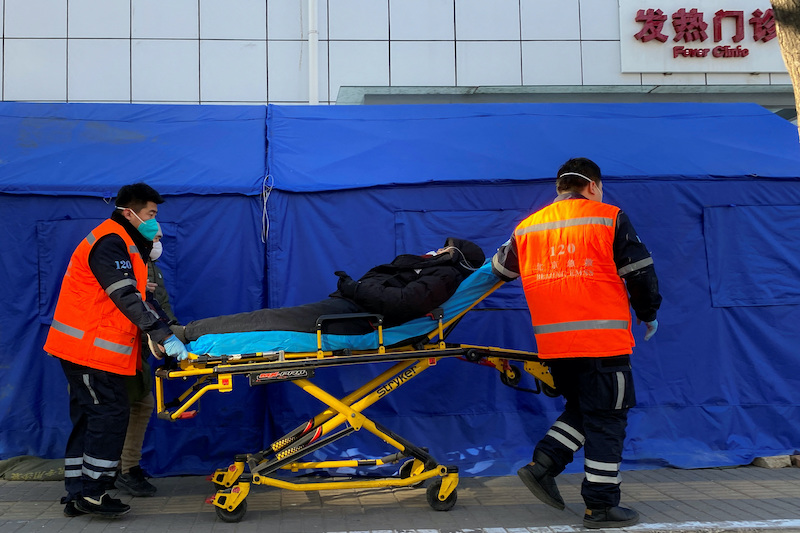Chinese officials are warning that the country’s Covid-19 crisis will peak within a week and strain the entire health system for up to two months.
With many workers falling ill, significant disruption is expected in the short-term before the economy bounces back next year.
In the face of a surging outbreak and widespread protests against its “zero-Covid” strategy, China began to end its mass testing and stringent lockdowns early this month, becoming the last major country to move towards living with the virus.
Its containment measures had slowed the economy to its lowest growth rate in nearly half a century, jamming global supply chains and trade.
Officials have been downplaying the severity of the disease and continue to report no new deaths. China reported less than 4,000 new symptomatic local Covid cases nationwide for Thursday December 22, and no new Covid deaths for a third consecutive day.
However, authorities have narrowed the criteria for Covid deaths, prompting criticism from many disease experts, who say the government’s data is unreliable.
‘5,000 Dying a Day’
Infections in China are likely to be more than a million a day with deaths at more than 5,000 a day – a “stark contrast” from official data, British-based health data firm Airfinity said this week.
The UK-based firm said it had used modelling based on regional Chinese data. Its estimates were “in stark contrast to the official data which is reporting 1,800 cases and only seven official deaths over the past week,” it said in a statement.
Anecdotal evidence and multiple reports and photos of hearses lined up outside local crematoria suggest these estimates are closer to reality.
Airfinity said its mortality risk analysis suggested between 1.3 to 2.1 million people could die in China’s current Covid outbreak. Analyses by other modelling groups have also predicted as many as 2.1 million deaths.
Airfinity estimates the wave could have two peaks at 3.7 million a day in mid-January in regions where cases are currently rising and 4.2 million a day in March in other provinces.
Cases were currently rising fastest in Beijing and in southern province of Guangdong, the firm said.
ALSO SEE:
Germany Sends First Foreign mRNA Covid Vaccines to China
‘Infection is Inevitable’
Zhang Wenhong, director of the National Centre for Infectious Diseases, was quoted in Shanghai government-backed news outlet The Paper on Thursday as saying China “is expected to reach the peak of infections within a week.”
“The peak infection will also increase the rate of severe disease, which will have a certain impact on our entire medical resources,” he said, adding the wave will last another one or two months after that.
“We must be mentally prepared that infection is inevitable.”
Zhang said he had visited nursing homes around Shanghai, but said the number of elderly dealing with severe symptoms was low.
Meanwhile, a Shanghai hospital estimated half of the commercial hub’s 25 million people would get infected by the end of next week.
Health System Unprepared
China’s abrupt change in policy appears to have caught its fragile health system unprepared, with hospitals scrambling for beds and blood, pharmacies for drugs and authorities racing to build clinics.
More than a dozen global health experts, epidemiologists, residents and political analysts interviewed by Reuters identified the failure to vaccinate the elderly and communicate an exit strategy to the public, as well as excessive focus on eliminating the virus, as causes of the strain on China’s medical infrastructure.
A drive to vaccinate the elderly that began three weeks ago has yet to bear fruit. China’s overall vaccination rate is above 90% but the rate for adults who have had booster shots drops to 57.9%, and to 42.3% for people aged 80 and older, according to government data.
China spent big on quarantine and testing facilities over the past three years rather than bolstering hospitals and clinics and training medical staff, these people said.
“There is an incredible lack of preparation for the virus coming despite them having … ample warning,” said Leong Hoe Nam, an infectious diseases doctor at Rophi Clinic in Singapore.
China’s National Health Commission did not respond to requests for comment on the criticisms.
The country has nine domestically developed Covid shots approved for use, but all are seen as less effective than Western-made vaccines that use the new mRNA technology.
A shipment of 11,500 BioNTech mRNA vaccines for German nationals in China has arrived at the German embassy in Beijing, an embassy spokesperson said on Friday.
The embassy hopes the first doses will be given out “as soon as possible”, the spokesperson said.
Change Welcomed Despite Surge
The World Health Organization has received no data from China on new Covid hospitalizations since Beijing lifted changed its policy. The WHO has said gaps in data might be due to Chinese authorities simply struggling to tally cases.
Amid mounting doubts about Beijing’s statistics, US Secretary of State Antony Blinken on Thursday said all countries, including China, need to share information on their experiences with Covid.
As COVID rages through China, residents who previously faced long periods of isolation are now learning to live with the virus.
Chinese teacher Yang Zengdong, whose whole family is isolating in their downtown Shanghai apartment, mildly ill with Covid, welcomes the change in policy.
Only weeks ago, they would have all been sent to a quarantine facility, and their building would have been locked down.
“When I think of this situation my feeling is just, ‘Wow, we are so lucky because now we can isolate at home’,” Yang said.
“This wave is something we have to face, because it is impossible to stay closed forever.”
- Reuters with additional editing by Jim Pollard
ALSO SEE:
Corporate China in ‘Deep Trouble’ as Covid Infects Workforce
World Bank Cuts China Growth Forecast For 2022 And 2023
Chinese Hospitals Swamped by Covid Wave, US Airs Concern























